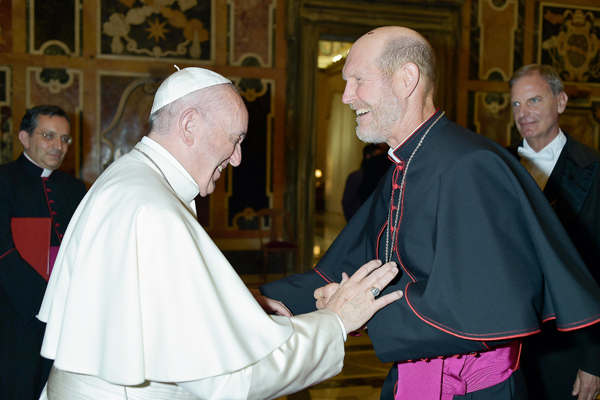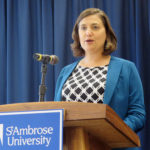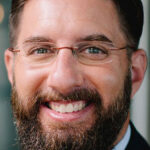
Pope Francis greets Bishop Thomas Zinkula at the Vatican in this file photo.
By Barb Arland-Fye
The Catholic Messenger
Bishop Thomas Zinkula views Pope Francis’ appointment of three women to the governing body responsible for choosing bishops as a decision of major significance. “This is the group in Rome that makes recommendations to the pope about who should become bishops in the Church. There arguably is nothing more important that a pope does in terms of shaping the culture of the Church than naming bishops.”
Appointed to the Dicastery of Bishops are Sister Raffaella Petrini, F.S.E., Secretary General of the Governorate of the Vatican City State; Sister Yvonne Reungoat, F.M.A, former Superior General of the Daughters of Mary Help of Christians; and Dr. Maria Lia Zervino, President of the World Union of Catholic Women’s Organizations. The other appointees to the dicastery are five cardinals, three cardinals-elect, an archbishop, a bishop and a priest. Vatican News, which announced the appointments July 13, noted, “The nomination of Dr. Zervino also marks the first appointment ever of a laywoman to the Vatican Dicastery.” Other women serve in decision-making roles at the Vatican as well.
“Having more women involved in the universal Church leadership brings to the table a more diverse perspective, a broader base of experience, and a more balanced awareness,” Bishop Zinkula told The Catholic Messenger. “In regards to the diocesan perspective, there certainly can be further growth in this area as well, but it isn’t a matter of starting from scratch in our diocese. At the chancery level, at least one woman has or has had the following leadership roles: Chancellor, Chief Financial Officer, Superintendent of Schools, Director of Human Resources, Director of the Office of Faith Formation, Director of Development, Director of Stewardship and Editor of The Catholic Messenger. Also, we have had women Parish Life Coordinators, and the last two presidents of St. Ambrose University (in Davenport) have been women.”
Professor Ella Johnson, a St. Ambrose University theologian, sees the appointments as a continuation of Pope Francis’ efforts to bring the Second Vatican Council to full fruition. She says the pope’s recent apostolic letter on the Liturgical Formation of the People of God and his reformation of the Vatican Curia and the Synod on Synodality are examples of “living out the ecclesiology of Vatican II.”
The Second Vatican Council recovered the faithful’s universal call to holiness and, by virtue of their baptism, their initiation into the three-fold mission of Christ as priest, prophet and king. Laity, men and women, were among the observers at the Council and women religious were among the lay auditors. They could not vote, however, Johnson noted. The appointment of women with voting rights to the Dicastery of Bishops “is going to shape some of the conversations” in the decision-making process. “I don’t think anything magic happens having women in the room. I think it depends on the perspective of the women involved.”
Johnson hopes these appointments will lead to “broader inclusion of voices in leadership roles.” Ordination is not a prerequisite to many leadership roles. This is not about women’s ordination but rather about greater representation in the universal Church, she said. “I see this as living out the theology articulated at Vatican II.”
The inclusion of married women and men in these leadership roles would be an important next step, she believes. “That’s a huge thing as bishops are shepherding the lay people, shepherding families.” She wonders whether lay people might one day have roles in the teaching office of the Church.
Pope Francis has “finally taken us down some of the roads paved by Vatican II, 60 years later,” says theologian Corinne Winter, professor emeritus of St. Ambrose University. “We can’t assume that the three women appointed to the Dicastery of Bishops have any particular theological leaning,” she said. “The fact that Pope Francis is appointing them to the dicastery says to me that he wants greater inclusivity at all levels of decision making in the Church.”
The pope’s reforms and appointments point to the synodal process in which he has engaged Catholics worldwide. He is also diversifying the College of Cardinals, Winter said. “He is carrying out something Pope John Paul II said he wanted — more women involved in decision making. Pope Benedict XVI also wanted to see more women involved in decision-making. Both wanted this involvement because they wanted the gifts of women to be represented.”
“Sometimes we are tempted to think that the only way women are going to influence the Church is if we have women clergy. These appointments demonstrate that is not the case. There are already positions that women can fill; parishes and the dioceses should also be looking at the ways in which women serve in leadership roles.
Do they receive the responsibility they are supposed to have? I think that’s what Pope Francis is saying in the Synod. Let people speak and let their words make a difference,” Winter said.











